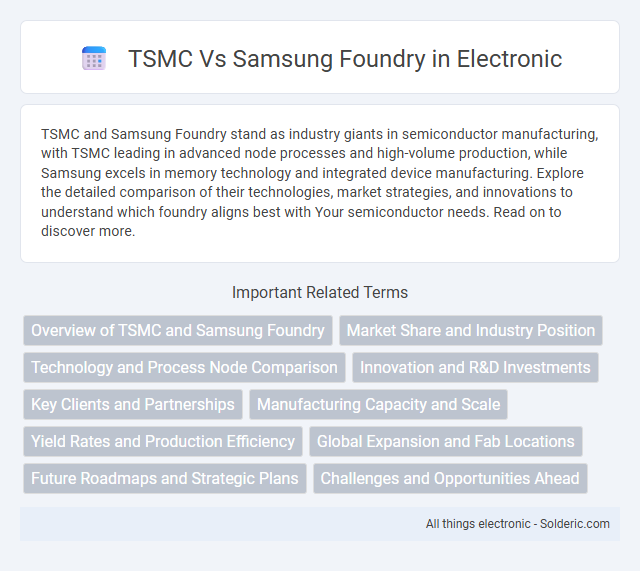TSMC and Samsung Foundry stand as industry giants in semiconductor manufacturing, with TSMC leading in advanced node processes and high-volume production, while Samsung excels in memory technology and integrated device manufacturing. Explore the detailed comparison of their technologies, market strategies, and innovations to understand which foundry aligns best with Your semiconductor needs. Read on to discover more.
Comparison Table
| Feature | TSMC | Samsung Foundry |
|---|---|---|
| Founded | 1987 | 1983 |
| Headquarters | Taiwan | South Korea |
| Market Share | ~56% (Global Semiconductor Foundry, 2024) | ~18% (Global Semiconductor Foundry, 2024) |
| Process Technology | 5nm, 3nm (Volume Production) | 5nm, 3nm (Ramp-up Stage) |
| Advanced Node Leadership | Industry Leader in 3nm and 5nm | Strong focus on EUV, 3nm in development |
| Business Model | Pure-play foundry (Fabless clients) | Foundry plus integrated device manufacturer (IDM) |
| Key Customers | Apple, AMD, NVIDIA, Qualcomm | Samsung Electronics, Qualcomm, AMD |
| Revenue (2023) | $75 billion | $30 billion |
| R&D Investment | Highest in foundry sector (~$5B annually) | Significant, focused on memory & logic integration |
| Technology Focus | Logic chips, GPUs, CPUs, AI chips | Logic, memory, AI chips, SoCs |
Overview of TSMC and Samsung Foundry
TSMC, the world's largest dedicated semiconductor foundry, specializes in advanced process technologies such as 5nm and 3nm nodes, serving major clients including Apple and AMD. Samsung Foundry, a major competitor, offers cutting-edge manufacturing capabilities with its 5nm and 3nm processes, leveraging its integrated device manufacturing strength to provide diverse semiconductor solutions. Both companies drive innovation in chip fabrication, emphasizing process maturity, yield improvement, and ecosystem support to maintain leadership in the global foundry market.
Market Share and Industry Position
TSMC dominates the semiconductor foundry market with a significant share exceeding 50%, positioning itself as the industry leader in advanced process technologies like 3nm and 5nm nodes. Samsung Foundry holds the second-largest market share, focusing on competitive technology nodes and expanding capacity to challenge TSMC's dominance. For your semiconductor manufacturing needs, understanding these market positions helps in choosing a partner aligned with cutting-edge innovation and production scale.
Technology and Process Node Comparison
TSMC leads the semiconductor foundry market with advanced process nodes, currently mass-producing chips at 3nm technology while advancing 2nm development, whereas Samsung Foundry is producing 3nm chips with Gate-All-Around (GAA) transistor architecture, aiming for 2nm shortly. TSMC's N3 process emphasizes high performance and power efficiency using FinFET technology, while Samsung's 3GAE process introduces GAA to enhance transistor density and reduce power leakage. The competition highlights TSMC's process maturity versus Samsung's innovation in transistor design, impacting their market shares in high-performance computing and mobile SoCs.
Innovation and R&D Investments
TSMC leads the semiconductor foundry market with an annual R&D investment exceeding $4 billion, driving advancements in 3nm and 2nm process technologies. Samsung Foundry allocates around $3 billion yearly toward innovation, emphasizing EUV lithography and next-generation DRAM integration. Both companies prioritize cutting-edge research to maintain leadership in advanced node development and semiconductor manufacturing efficiency.
Key Clients and Partnerships
TSMC's key clients include Apple, AMD, and Nvidia, leveraging its advanced 5nm and 3nm process technologies to secure long-term contracts. Samsung Foundry partners with Qualcomm, IBM, and Google, emphasizing its leadership in EUV lithography and high-performance 3nm nodes. Both companies maintain strategic collaborations with major semiconductor firms to enhance supply chain stability and accelerate innovation in chip manufacturing.
Manufacturing Capacity and Scale
TSMC boasts an extensive manufacturing capacity with advanced 5-nanometer and 3-nanometer process nodes, operating multiple fabs primarily in Taiwan that deliver over 13 million wafer starts per year. Samsung Foundry, while competitive with cutting-edge 3-nanometer technology, maintains a growing but comparatively smaller scale, with major fabrication facilities in South Korea and the U.S., focusing on flexibility across various process technologies. TSMC's dominant market share and larger production scale enable it to meet high-volume demands for leading semiconductor customers worldwide.
Yield Rates and Production Efficiency
TSMC consistently achieves higher yield rates in advanced process nodes such as 5nm and 3nm, leveraging cutting-edge manufacturing technology and extensive experience. Samsung Foundry, while competitive in production capacity, often faces challenges in matching TSMC's defect density control and overall production efficiency. Superior yield rates at TSMC translate to lower costs per chip and higher profitability, solidifying its position as the leading semiconductor foundry.
Global Expansion and Fab Locations
TSMC leads global expansion with strategic fabrication plants in Taiwan, the United States, Japan, and plans for Europe, optimizing proximity to key markets and technology ecosystems. Samsung Foundry operates diverse fabs in South Korea, the United States, and Texas, focusing on advanced 3nm and 5nm process nodes to enhance production capabilities. Your choice between TSMC and Samsung Foundry can impact supply chain resilience and access to cutting-edge semiconductor manufacturing technologies.
Future Roadmaps and Strategic Plans
TSMC's future roadmap emphasizes advanced 3nm and 2nm process nodes with strong investments in EUV technology and high-volume manufacturing capabilities. Samsung Foundry focuses on expanding its 3nm GAA (Gate-All-Around) technology and diversifying applications across 5G, AI, and automotive sectors. Your strategic choice should consider TSMC's leadership in scalability and ecosystem support versus Samsung's aggressive innovation and integrated device manufacturing approach.
Challenges and Opportunities Ahead
TSMC faces challenges in maintaining its technological lead amid Samsung Foundry's aggressive investments in advanced process nodes and capacity expansion. Samsung's push towards 3nm and beyond presents opportunities for innovation but also heightens the competition for high-volume clients in AI and 5G sectors. Your strategic decisions will heavily depend on how these foundries navigate supply chain constraints and geopolitical tensions impacting semiconductor manufacturing.
TSMC vs Samsung Foundry Infographic

 solderic.com
solderic.com